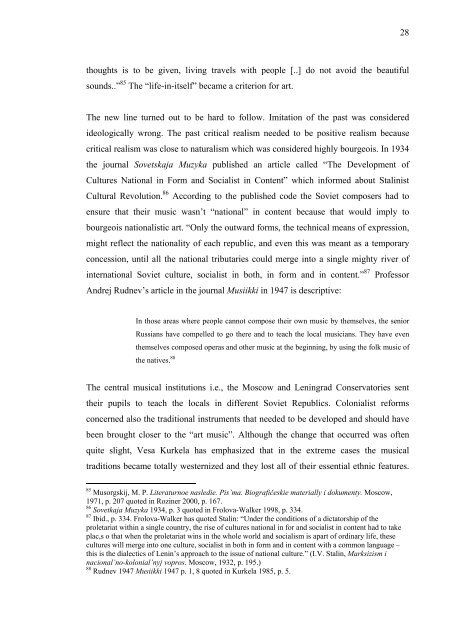Boris Asaf'ev and the Soviet Musicology - E-thesis
Boris Asaf'ev and the Soviet Musicology - E-thesis
Boris Asaf'ev and the Soviet Musicology - E-thesis
You also want an ePaper? Increase the reach of your titles
YUMPU automatically turns print PDFs into web optimized ePapers that Google loves.
thoughts is to be given, living travels with people [..] do not avoid <strong>the</strong> beautiful<br />
sounds..” 85 The “life-in-itself” became a criterion for art.<br />
The new line turned out to be hard to follow. Imitation of <strong>the</strong> past was considered<br />
ideologically wrong. The past critical realism needed to be positive realism because<br />
critical realism was close to naturalism which was considered highly bourgeois. In 1934<br />
<strong>the</strong> journal Sovetskaja Muzyka published an article called “The Development of<br />
Cultures National in Form <strong>and</strong> Socialist in Content” which informed about Stalinist<br />
Cultural Revolution. 86 According to <strong>the</strong> published code <strong>the</strong> <strong>Soviet</strong> composers had to<br />
ensure that <strong>the</strong>ir music wasn’t “national” in content because that would imply to<br />
bourgeois nationalistic art. “Only <strong>the</strong> outward forms, <strong>the</strong> technical means of expression,<br />
might reflect <strong>the</strong> nationality of each republic, <strong>and</strong> even this was meant as a temporary<br />
concession, until all <strong>the</strong> national tributaries could merge into a single mighty river of<br />
international <strong>Soviet</strong> culture, socialist in both, in form <strong>and</strong> in content.” 87 Professor<br />
Andrej Rudnev’s article in <strong>the</strong> journal Musiikki in 1947 is descriptive:<br />
In those areas where people cannot compose <strong>the</strong>ir own music by <strong>the</strong>mselves, <strong>the</strong> senior<br />
Russians have compelled to go <strong>the</strong>re <strong>and</strong> to teach <strong>the</strong> local musicians. They have even<br />
<strong>the</strong>mselves composed operas <strong>and</strong> o<strong>the</strong>r music at <strong>the</strong> beginning, by using <strong>the</strong> folk music of<br />
<strong>the</strong> natives. 88<br />
The central musical institutions i.e., <strong>the</strong> Moscow <strong>and</strong> Leningrad Conservatories sent<br />
<strong>the</strong>ir pupils to teach <strong>the</strong> locals in different <strong>Soviet</strong> Republics. Colonialist reforms<br />
concerned also <strong>the</strong> traditional instruments that needed to be developed <strong>and</strong> should have<br />
been brought closer to <strong>the</strong> “art music”. Although <strong>the</strong> change that occurred was often<br />
quite slight, Vesa Kurkela has emphasized that in <strong>the</strong> extreme cases <strong>the</strong> musical<br />
traditions became totally westernized <strong>and</strong> <strong>the</strong>y lost all of <strong>the</strong>ir essential ethnic features.<br />
85 Musorgskij, M. P. Literaturnoe nasledie. Pis’ma. Biografičeskie materially i dokumenty. Moscow,<br />
1971, p. 207 quoted in Roziner 2000, p. 167.<br />
86 Sovetkaja Muzyka 1934, p. 3 quoted in Frolova-Walker 1998, p. 334.<br />
87 Ibid., p. 334. Frolova-Walker has quoted Stalin: “Under <strong>the</strong> conditions of a dictatorship of <strong>the</strong><br />
proletariat within a single country, <strong>the</strong> rise of cultures national in for <strong>and</strong> socialist in content had to take<br />
plac,s o that when <strong>the</strong> proletariat wins in <strong>the</strong> whole world <strong>and</strong> socialism is apart of ordinary life, <strong>the</strong>se<br />
cultures will merge into one culture, socialist in both in form <strong>and</strong> in content with a common language –<br />
this is <strong>the</strong> dialectics of Lenin’s approach to <strong>the</strong> issue of national culture.” (I.V. Stalin, Marksizism i<br />
nacional’no-kolonial’nyj vopros. Moscow, 1932, p. 195.)<br />
88 Rudnev 1947 Musiikki 1947 p. 1, 8 quoted in Kurkela 1985, p. 5.<br />
28

















